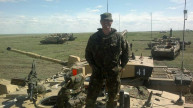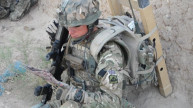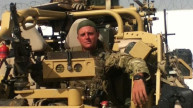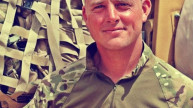Andy's Story
“Life was like a fever dream – nothing made sense.”
An IED explosion in Afghanistan meant the end of Andy’s military career and left him battling physical and mental injuries. Now, following our expert mental health treatment Andy is living life again.
After becoming disillusioned with civvy life, Andy joined the Army at 26 and found it a perfect fit. “I absolutely loved it - even the rubbish that came with it,” he says. “When I joined up, I just knew I wanted to do that for the rest of my life.”
He went on to spend nine years with the King’s Royal Hussars, where he gained a degree in Arabic. “My career was mapped out for me and I was going to move on to do something with my linguistics,” he says. “As it happened it didn’t turn out like that.”
During a deployment to Afghanistan in 2012, the vehicle Andy was in was blown up by a 40kg IED which “blew it to pieces”. “It was three days before I was due to fly home for my daughter’s second birthday party,” he says, “Things had been kinetic with the Taliban as we’d been putting the pressure on. They’d started using IEDs, so going out on patrol wasn’t everyone's cup of tea. I was in the middle vehicle as we drove along on patrol and when we drove over the IED it detonated behind the front wheel and blew the vehicle to pieces.
“I remember the stones still falling and I shouted for the driver. I checked him and hugged him like a father with his kid, then checked everyone else. I was talking absolute concussed nonsense but physically I was doing the right thing. Dumb luck meant that I didn't lose my head, but I did dislocate my jaw and sustained a brain injury. Out of any scenario that could have happened that day, the best one was the injuries that we sustained because somehow, we all walked away from that - and we shouldn't have.”
At first medics didn’t realise the extent of Andy’s injuries, and it was only later that he was diagnosed with a traumatic brain injury. He was quickly transferred to the Army’s rehabilitation centre in Surrey where he spent the next three years in and out of treatment, before leaving the Army in 2015. “It was then that I properly tumbled mentally,” he says. In long-lasting chronic pain from the blast and suffering with undiagnosed Complex-PTSD, life was unbearable.
Andy found himself avoiding situations and not trusting anyone. His relationship broke down and he was hypervigilant. “My brain injury and my C-PTSD just held hands and went ‘let's make this difficult,” he says.
“Life was like a fever dream – nothing made sense. I couldn't go to the park with my wife and daughter because I was so exhausted but I didn’t know why. I was hypervigilant so was always checking things - if a window was open on a building on a journey somewhere I’d notice it and would check it on the way back too. My wife would ask ‘do you remember what that guy was wearing at the petrol station?’ and I could describe him totally.”
Growing apart from his family and knowing he needed help, Andy called our Helpline and started nine years of treatment for C-PTSD. “It took me a while to realise how bad my mental health was, but when I started unpicking it with my therapist I realised,” he says. “My brain had reversed to zero to protect itself - the last time my brain remembered being safe was in Afghanistan, just before I was blown up.”
Andy made great strides in treatment but reached a point where he couldn’t progress any further until his physical pain was under control. His Combat Stress clinician put him in touch with King Edward VII’s Hospital to take part in their pain management programme, which unlocked the rest of his mental health recovery journey.
Andy was discharged from our treatment last year and now feels he understands himself. “This is the first year I've not been in any kind of treatment at all since I got blown up,” he says. “I’ve had to adjust my expectations of what I can achieve, but my kids have a father and my wife has a husband thanks to Combat Stress and King Edward VII’s Hospital.”
As a thank you, Andy completed an astonishing seven marathons in seven days to raise money for Combat Stress and King Edward VII Hospital – running 186 miles in that time. He picked up an injury while he was running but has now challenged himself to use his injury rehab as another way to raise funds and has set himself a target of completing a further five marathons, taking it to 12 over three months.
“It’s important to me to do something for Combat Stress and King Edward VII’s Hospital. I want to help these organisations to continue providing their life-changing support to others, as well as act as living-proof that it’s never too late to get help nor is any journey to recovery too steep to climb.”
June 2025








